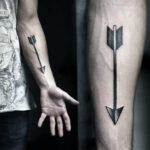Religious tattoos have surged in popularity, becoming a profound way for individuals to express their spirituality and commitment. Among men, religious tattoos hold a particularly significant place, acting as visible declarations of faith, devotion, and personal beliefs. While the practice of tattooing has evolved over centuries, the desire to mark the body with symbols of faith remains a timeless human impulse. This exploration delves into the world of Male Religious Tattoos, examining their meanings, motivations, and considerations for those seeking to permanently inscribe their beliefs.
The Growing Trend of Religious Tattoos Among Men
Tattoos have transitioned from subculture markings to mainstream forms of self-expression. This broader acceptance has paved the way for a greater openness towards religious ink. For men, religious tattoos can represent a powerful intersection of personal identity and spiritual conviction. They are not merely decorative; they are often deeply meaningful emblems of faith journeys, spiritual milestones, or unwavering adherence to religious principles.
The motivations behind choosing religious tattoos are diverse. For some, it’s a way to outwardly display their faith in a world where personal beliefs are often kept private. For others, a religious tattoo serves as a constant reminder of their values, providing strength and guidance through daily life. Memorializing a religious figure, a significant biblical passage, or a symbol representing their faith tradition are also common reasons men choose religious tattoos. This visual commitment can be a source of comfort, inspiration, and a way to connect with something larger than themselves.
Meanings and Symbolism in Male Religious Tattoos
The imagery within religious tattoos is rich and varied, drawing from a vast wellspring of faith traditions. Within Christianity, certain symbols resonate deeply with men seeking to express their beliefs through body art.
Christian Symbols: Crosses, Angels, and More
The cross, in its myriad forms, is arguably the most universal Christian symbol and a cornerstone of religious tattoos for men. From the simple Latin cross to the ornate Celtic cross, each style carries its own nuance. A cross tattoo can represent sacrifice, redemption, faith in Christ, or a personal connection to the crucifixion narrative. Placement can also add layers of meaning, with a cross on the chest signifying faith close to the heart, or on the back representing carrying the cross of life.
Alt text: Detailed Celtic cross tattoo on a man’s forearm, symbolizing faith and heritage.
Angels are another popular motif, embodying protection, guidance, and the divine. Archangels like Michael, often depicted as a warrior, can symbolize strength and overcoming adversity. Angel wings, whether spread across the back or subtly placed on shoulders, evoke a sense of freedom, spirituality, and connection to the celestial realm.
Alt text: Powerful angel wings tattoo spanning a man’s upper back, representing divine protection and spiritual ascent.
Biblical verses and figures also feature prominently in male religious tattoos. Inscriptions of scripture offer a constant source of inspiration and a public declaration of faith. Images of Jesus Christ, whether as the Good Shepherd, Christ Pantocrator, or in other iconic depictions, are chosen to express devotion and emulate Christ-like virtues. Saints, revered figures within Catholicism and other Christian traditions, can be tattooed as a way to seek intercession or embody specific virtues associated with that saint.
Beyond Christianity, men from diverse faith backgrounds also seek tattoos that reflect their spiritual paths. While less common in some Abrahamic religions due to historical interpretations regarding body modification, there are evolving perspectives and individual expressions within these faiths as well. In other spiritual traditions, symbols like the Dharma wheel in Buddhism or the Om symbol in Hinduism might be chosen to represent core tenets and personal spiritual journeys.
Personal Interpretations and Artistic Freedom
Ultimately, the meaning of a religious tattoo is deeply personal. While symbols carry traditional interpretations, individuals often imbue their tattoos with unique significance. A man might choose a specific design of a cross to honor a family member, or select a particular Bible verse that resonated during a challenging time. The beauty of religious tattoos lies in this intersection of established symbolism and individual meaning.
The artistic style also plays a crucial role. Religious tattoos can range from minimalist line work to elaborate, photorealistic portraits. The choice of style reflects personal aesthetics and can further enhance the message of the tattoo. A bold, traditional style might convey steadfastness, while a watercolor style could represent a more fluid and evolving faith journey.
Considerations Before Getting a Religious Tattoo
Committing to a tattoo, especially one with religious significance, requires thoughtful consideration. It’s more than just choosing a design; it’s about permanently marking your body with a symbol of your deepest beliefs.
Meaning, Commitment, and Reverence
Reflect deeply on the meaning you wish to convey. Does the chosen symbol truly represent your faith? Is it a belief you foresee holding long-term? Religious tattoos are not fleeting trends; they are intended to be lasting expressions of faith.
Consider the concept of reverence and respect for your body. Some, like the author of the original article, view the body as a temple. Approaching a religious tattoo with this perspective means choosing imagery and placement that honors this sacred view. However, for many, adorning the body with religious symbols is itself an act of reverence, a way to carry their faith with them and express it to the world.
Placement and Design
Placement is both a practical and symbolic consideration. Visible placements like forearms or calves make a clear statement, while more discreet placements like the upper back or ribs offer a more personal and private expression. Consider your comfort level with the visibility of your tattoo in different settings.
Work with a skilled tattoo artist who understands religious symbolism and can translate your vision into a meaningful and aesthetically pleasing design. Discuss your ideas, research different styles, and ensure the artist is comfortable and respectful of the religious imagery.
Evolving Perspectives and Personal Journeys
Faith journeys are often dynamic and evolving. While a religious tattoo represents a current conviction, acknowledge that personal beliefs can deepen or shift over time. Choose symbols and meanings that resonate deeply and hold enduring value, even as your understanding of faith matures.
Examples of Powerful Male Religious Tattoos
-
The Crucifix on the Chest: A classic and powerful statement of faith, often rendered in realistic detail or bold, traditional lines.
-
Archangel Michael on the Forearm: Depicting the warrior angel defeating evil, symbolizing strength, protection, and spiritual warfare.
-
Bible Verse on the Back: A meaningful scripture passage inscribed along the spine or across the shoulders, offering daily inspiration and a testament to faith.
-
Guardian Angel on the Shoulder: A comforting image symbolizing divine protection and guidance, often chosen as a reminder of spiritual presence.
-
Sacred Heart on the Bicep: A traditional Catholic symbol of divine love and compassion, often rendered in vibrant colors or classic black and grey.
These are just a few examples, and the possibilities are as diverse as individual faith experiences. The power of male religious tattoos lies in their ability to visually articulate deeply held beliefs, providing a source of personal strength, spiritual connection, and a visible testament to faith.
Conclusion
Male religious tattoos are more than just ink; they are profound expressions of faith, devotion, and personal spirituality. As tattoos become increasingly accepted, religious ink offers men a powerful avenue to outwardly declare their beliefs and carry their faith with them, wherever they go. By thoughtfully considering meaning, symbolism, and personal motivations, men can choose religious tattoos that are not only aesthetically meaningful but also deeply resonant with their spiritual journeys. Exploring the rich tapestry of religious symbols and artistic styles opens a world of possibilities for those seeking to express their faith through the enduring art of tattooing.
Please note: This article is for informational purposes only and does not offer religious advice. Consult with religious leaders or scholars for theological perspectives on tattoos within specific faiths. Explore our gallery for further inspiration on male religious tattoos.

